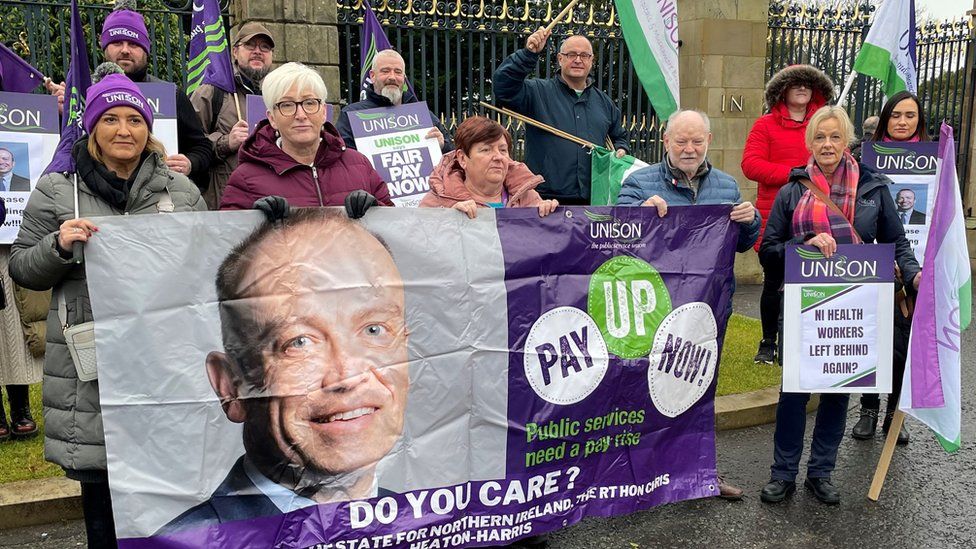1 hour ago
About sharing
People in Northern Ireland will face severe disruption on Thursday as more than 100,000 public sector workers including teachers, nurses and bus drivers go on strike.
It is expected to be the biggest strike in Northern Ireland in 50 years.
The co-ordinated action between 16 trade unions will see workers walk out in ongoing disputes over pay.
The strike will halt buses and trains, close schools and severely disrupt health services.
Unions will hold rallies in towns and cities including Belfast, Londonderry, Omagh and Enniskillen.
People have been advised to take care to reduce the chances of requiring treatment in the “significantly reduced health service”, and to only make essential journeys as the combination of icy conditions and a lack of road gritting will make driving hazardous.
The strikes are happening due to escalating pay disputes, with many public sector workers in Northern Ireland paid less than counterparts in the rest of the UK.
This, combined with the cost-of-living crisis and the ongoing political crisis which has seen Northern Ireland go without devolved government for almost two years, has led to a series of strikes in healthcare, education, transport and other public sectors in recent months.
However, Thursday will see 16 unions join together for a “generalised day of action”.
How will the strike affect me?
The strike will cause widespread disruption.
The Department of Health has said there will be a “significantly reduced health service” and people are advised to take care “to reduce your chances of needing health service treatment”.
Northern Ireland strikes: All you need to know in 120 seconds
However, they have also said that if you do require emergency hospital care, “you must seek it immediately”.
Most cancer services including chemotherapy treatment will not go ahead. During previous industrial action, these services operated as normal.
Dialysis patients are also affected with just several appointments scheduled across the system.
The strike will compound the daily pressures facing Northern Ireland’s health service, which is already struggling with budget problems, severe staff shortages and the worst waiting lists in the UK.
Other services affected by the strike include:
GPs: They are not on strike but will only be operating on an emergency-only basis
Scheduled hospital appointments: Most of them have been cancelled
Ambulances: Will be focused on the most urgent cases
Translink bus and train services: All are cancelled
Schools: Most, if not all, will be closed
Road gritting: Non-major roads will not be treated, and motorists are urged to take care given the icy weather
Courts and tribunals: Offering a limited service
Strike impact: ‘I think it should be postponed’
Ashleen Quigley, from Limavady, County Londonderry, is a home care assistant who drives up to 50 miles per day visiting people who need her care.
She said she is anxious about going out to see her clients when road gritters have not treated the icy roads.
“How are we expected to get to our clients whenever the weather is so bad?” she said.
“I look after people and I might be the only individual they might see, they might really need me to go to the toilet or even get a meal.”
She added: “I understand why they are going on strike, but there have been such serious weather warnings going out this week – I think it should be postponed.”
Read more about the impact of the strikes.
Why are so many workers going on strike?
Public sector pay in Northern Ireland has fallen sharply in real terms over the last two years due to high inflation, a shortfall in Stormont’s budget and a lack of local ministers to allocate existing resources.
Some public sector workers, including Translink staff, have not been offered any pay rise at all this year because their employer does not have the money to cover the increase.
Meanwhile, as part of political talks aimed at restoring power-sharing government in Northern Ireland, the gUK government offered £584m to resolve pay issues as part of a larger deal.
However, that money is dependent on Stormont’s return and the Democratic Unionist Party (DUP) has not yet agreed to end its boycott of power-sharing government in Northern Ireland due to its protest against post-Brexit trade rules.
Unions have been angered by Northern Ireland Secretary Chris Heaton-Harris making the £584m pay offer conditional on the restoration of devolution.
They argue that public sector workers are being used as “pawns” in an attempt to pressurise politicians to end the standoff.
Political parties in Northern Ireland, including the DUP, have also called on Mr Heaton-Harris to release the money.
However Mr Heaton-Harris has said it is a devolved matter for Northern Ireland and that intervening in the dispute would be as close as it gets to direct rule – when Northern Ireland is governed directly from Westminster.
Related Topics
13 hours ago
1 day ago
15 hours ago
2 days ago
8 hours ago
19 December 2023
